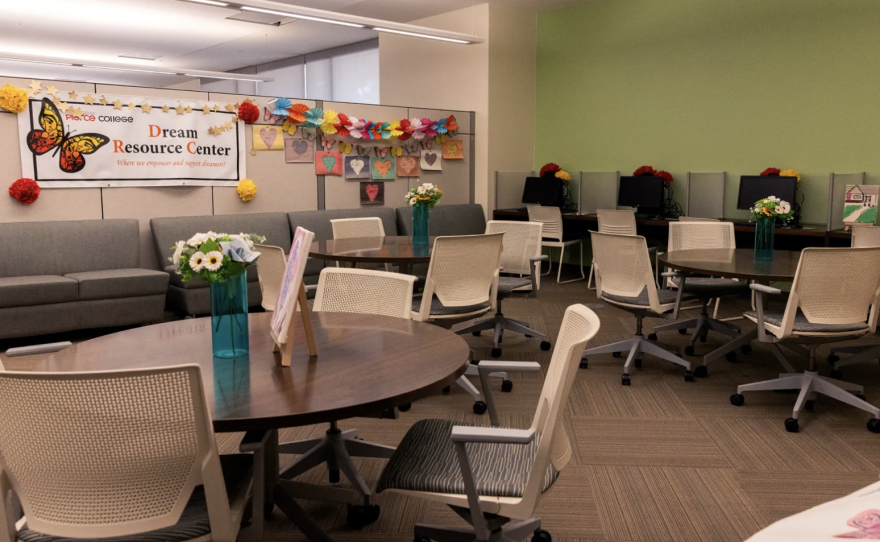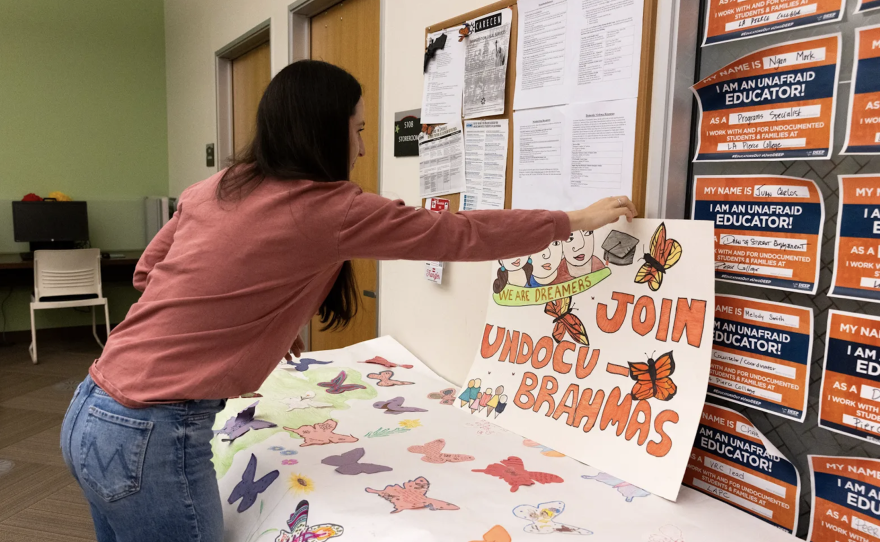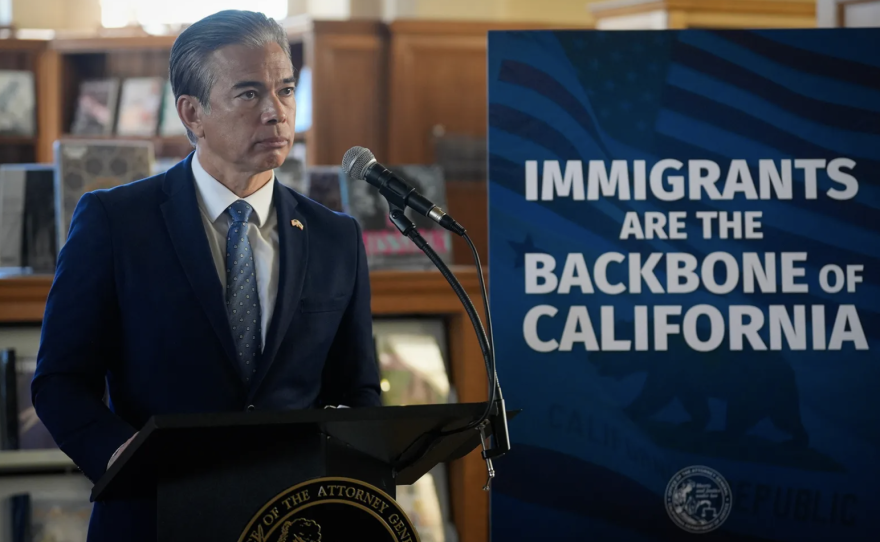As President Donald Trump begins his second term with a declaration of a national emergency at the southern border and a steadfast pledge of mass deportations, California’s colleges and universities have been holding workshops and partnering with legal service nonprofits to help undocumented students on their campuses stay in school.
Across the University of California and California State University systems, as well as at many California community college campuses, Dream resource centers support the state’s estimated 100,000 undocumented students and students from mixed-status families. An estimated 3.3 million Californians live in mixed-status households, according to data from Equity Research Institute, a USC research group. These centers assist students with filling out financial aid forms, referrals to nonprofit immigration law firms, access to mental health support, and provide spaces to bond, do schoolwork or take a break.
Several Dream center coordinators and their nonprofit legal partners said they have seen unprecedented demand for legal services from undocumented college students since Trump’s election victory in November. Legal service providers say their free consultations are booked for several months with students seeking to understand the level of risk of deportation faced by them and their families.
Student demand for immigration legal services skyrockets
It’s been tough for Carlos, a student at Sacramento State, to concentrate since Trump’s election win. News about Trump’s immigration and deportation plans on social media serve as a constant reminder of his undocumented status and risk of deportation under the new administration.
“I would try to write whatever paper I needed to, solve whatever equation I needed to, and for some reason, I just couldn’t do it,” Carlos said. “Those (election) results were just in the back of my mind.” CalMatters is only publishing Carlos’ first name at his request because he fears sharing his identity could lead to authorities targeting him for deportation.
“At the end of the day, how I cope is just like going to the center and being around the friends I’ve made there,” he said of Sacramento State’s Dreamer Resource Center.
Through workshops hosted by the center’s nonprofit legal partner, the Coalition for Humane Immigrant Rights, Carlos is able to turn fear into action. He’s learned about his due process rights and how to react if immigration enforcement officials show up at his door: remain silent, remain inside and call an immigration attorney as soon as possible. Immigration enforcement officers cannot legally enter your home unless they have a warrant, signed by a judge, with the correct name and address listed, legal service providers advise.
“There’s a lot of fear mongering out there. We want students to know that their education is available to them.”D’arcy Corwin, Dream Resource Center coordinator at Los Angeles Pierce College
A 2019 state law encouraged the designation of Dream resource liaisons at the state’s public colleges and universities, and many have created physical Dream centers on their campuses to help undocumented students navigate financial aid applications and connect them with free legal services. The state has since provided $52.2 million over five years to fund these centers and liaisons. California serves the greatest share of undocumented college students in the country, with the highest portion of those students attending one of the state’s 116 community colleges.
Since 2001, when lawmakers approved AB 540, undocumented students who attend a California high school for three years and graduate have been eligible to pay resident tuition at the state’s public colleges and universities. Resident tuition is significantly cheaper than non-resident tuition in each of the state’s three public higher education systems.

At the University of California, nonresident tuition is approximately $35,000 more per year than California residents pay. Nonresident students in the Cal State system pay an extra fee of $420 per semester unit, in addition to the standard $6,000 annual tuition. At California community colleges, resident tuition is $46 per unit, and nonresident tuition varies, but is typically at least five times that cost.
Although undocumented college students are ineligible for federal financial aid, many are able to apply for the state’s flagship financial aid program, the Cal Grant. These students must enroll at a California college and have a family income below the maximum threshold to apply through the California Dream Act Application. More than 35,000 undocumented students submit the application each year, but only about a third receive aid.
As the Dream Resource Center coordinator at Los Angeles Pierce College, D’arcy Corwin has been listening to her students’ fears — and “having their backs.” That’s meant connecting them with food programs and immigration lawyers, hosting events that teach self-advocacy and helping them fill out financial aid applications.
“There’s a lot of fear mongering out there,” Corwin said. “We want students to know that their education is available to them.”
Immigration experts have warned that those at the highest risk of deportation under the Trump administration are non-citizens who have had past convictions or other contact with the criminal justice system, as well as the 1.3 million people nationwide who have received final orders of removal.

After Trump’s election, Guillermo Metelin Bock, who leads the Undocumented Student Services program at Stanislaus State, says that the questions from students have transitioned from financial aid and college affordability to immigration policy. To get those questions answered, students at Stanislaus State have access to legal services through a partnership with Immigrant Legal Defense, a free legal service provider that partners with nine Cal State campuses and 34 community colleges in the Bay Area and Central Valley.
Many Cal State and community college Dream centers partner with nonprofits that provide free immigration law assistance, including the Coalition for Humane Immigrant Rights, the Central American Resource Center and Immigrant Legal Defense. Students at nine University of California campuses also have access to free legal support through the systemwide Immigrant Legal Service Center, housed at the UC Davis School of Law. These nonprofits and campus resources create a geographic patchwork of immigration legal help, serving students throughout California. With Trump’s threats of mass deportations, immigration legal nonprofits say the demand for their services has skyrocketed.
According to Geno Uyuni, a staff attorney at the nonprofit Central American Resource Center, which provides free immigration legal services to students at 20 colleges and universities, her consultations are currently booked through March. In those sessions, Uyuni works with undocumented students to explore their options for green cards, citizenship, work permits and other applications.
Uyuni said “the most heartbreaking cases” are the students who came to the U.S. as children, but who have no available path to citizenship. She is sometimes the first person to deliver the news that even if they attain a college degree, they will likely never be able to work legally in the United States.
“There’s a disconnection between how much California supports you to get through school, but then there is little support beyond that,” Uyuni said.


A growing number of college students are ineligible for protections like work authorization under the Deferred Action for Childhood Arrivals program or DACA, as only people who applied before 2017 are able to renew their status following attempts by the first Trump administration to end the program.
While the Trump administration has yet to announce any new attempts to end the program, the future of DACA remains in limbo. On Jan. 17 the 5th Circuit Court of Appeals upheld a lower U.S. district court ruling that found some protections for DACA recipients to be illegal. The ruling still allows for DACA recipients to renew their status if already approved, but no new DACA applications can be processed. The case is likely to be appealed to the Supreme Court.
Founding Co-Executive Director of Immigrant Legal Defense Barbara Pinto says their online booking system saw “the biggest spike I think we’ve seen since we started this project” shortly after the presidential election results were clear.
Between the election and Trump’s inauguration, Pinto’s team hustled to file green card applications and DACA renewals in anticipation that the processing times for applications will grow during a Trump administration. Although it is difficult for Pinto to gauge exactly what Trump’s plans are, she said that the president would have to undergo a legal process to terminate DACA, meaning that the program would most likely not be eradicated overnight.
“Trump says a lot of things, and sometimes they’re true and sometimes they are not, and sometimes he follows through, and sometimes he doesn’t,” Pinto said.
The state steps in to protect undocumented students
Immediately following his inauguration Jan. 20, Trump began rolling out executive orders cracking down on immigration. In addition to the national emergency declaration, Trump designated Mexican drug cartels as foreign terrorist organizations. He also issued an executive order trying to end birthright citizenship, despite its guarantee in the 14th Amendment of the U.S. Constitution. Twenty-two states, including California, are suing to challenge this attempt, and on Jan. 23 a federal judge temporarily blocked it from taking effect.
On Jan. 21, the Trump administration threw out policies dating back to 2011 limiting immigration agents from arresting undocumented people at sensitive locations, including churches and schools. In California, state law states that K-12 school officials do not have to allow immigration enforcement on campus without a judicial warrant. At the college and university level, the policies are less clear-cut, because parts of campuses are open to the public, while other areas, such as dorms, require a judicial warrant for immigration enforcement to enter.
“Criminals will no longer be able to hide in America’s schools and churches to avoid arrest,” the Department of Homeland Security said in a Jan. 21 statement. “The Trump Administration will not tie the hands of our brave law enforcement, and instead trusts them to use common sense.”

California lawmakers are working to resist Trump’s deportation plans, but there’s only so much they can do at the state level. State Attorney General Rob Bonta issued directives to California’s public colleges and universities, reminding them of existing state laws that limits them from assisting federal immigration enforcement.
Bonta also emphasized that California local law enforcement agencies, including campus police departments, are prohibited by a 2017 state law from “generally providing personal information… about an individual for immigration enforcement purposes, including, but not limited to, the individual’s home address or work address, unless that information is available to the public.”
Gov. Gavin Newsom and Democratic legislative leaders have agreed to set aside $50 million in state money to pay for the legal costs of fighting the Trump administration. Additionally, the current state Senate budget bill would allocate $10 million for legal service providers to support immigrants, as well as $15 million for legal support of “vulnerable persons,” including those at risk of deportation.
Since 2019, the state has allocated money to support the immigration legal service providers that partner with public colleges and universities, doling out a total of $2.9 million to the University of California, $42 million for the California State University and $50 million for the California community colleges. Gov. Gavin Newsom’s proposed 2025-26 state budget includes an allocation of $17.6 million to immigration legal services for public higher education institutions, along with $11.6 million for Dream resource liaisons.
Some Dream center coordinators and their nonprofit legal partners said state funding is critical, and are calling for more stable money to fund their work. The Central American Resource Center based in Los Angeles received $9.3 million in government grants in 2023, which it primarily used to provide legal advice and services to more than 20,000 people in California. Uyuni said that the government funding they receive, which makes up the vast majority of their budget, can often be politicized, and can fluctuate substantially between state budget proposals.
“We’re in limbo sometimes, and it’s this uncertainty about funding,” Uyuni said. “I wish funding could be increased, so that we could spread the work across more people to help more students, sooner.”
Many undocumented college students are left uncertain of their futures — a situation that resonates with David Alvarez, a Democratic Assemblymember from Chula Vista and the son of undocumented immigrants.
Alvarez emphasized there is still a legal process to be followed, and mass deportations can’t happen overnight. “As a state, we are doing what can be done, which is to provide resources and ensure the immigration process is being followed according to the law, in hopes that that process can enshield our students,” he said.
Want to know what support your college or university offers undocumented students?
- Resources for California community college students
- Resources for California State University students
- Resources for University of California students
Brumer and Sosa are contributors with the College Journalism Network, a collaboration between CalMatters and student journalists from across California. CalMatters higher education coverage is supported by a grant from the College Futures Foundation.







